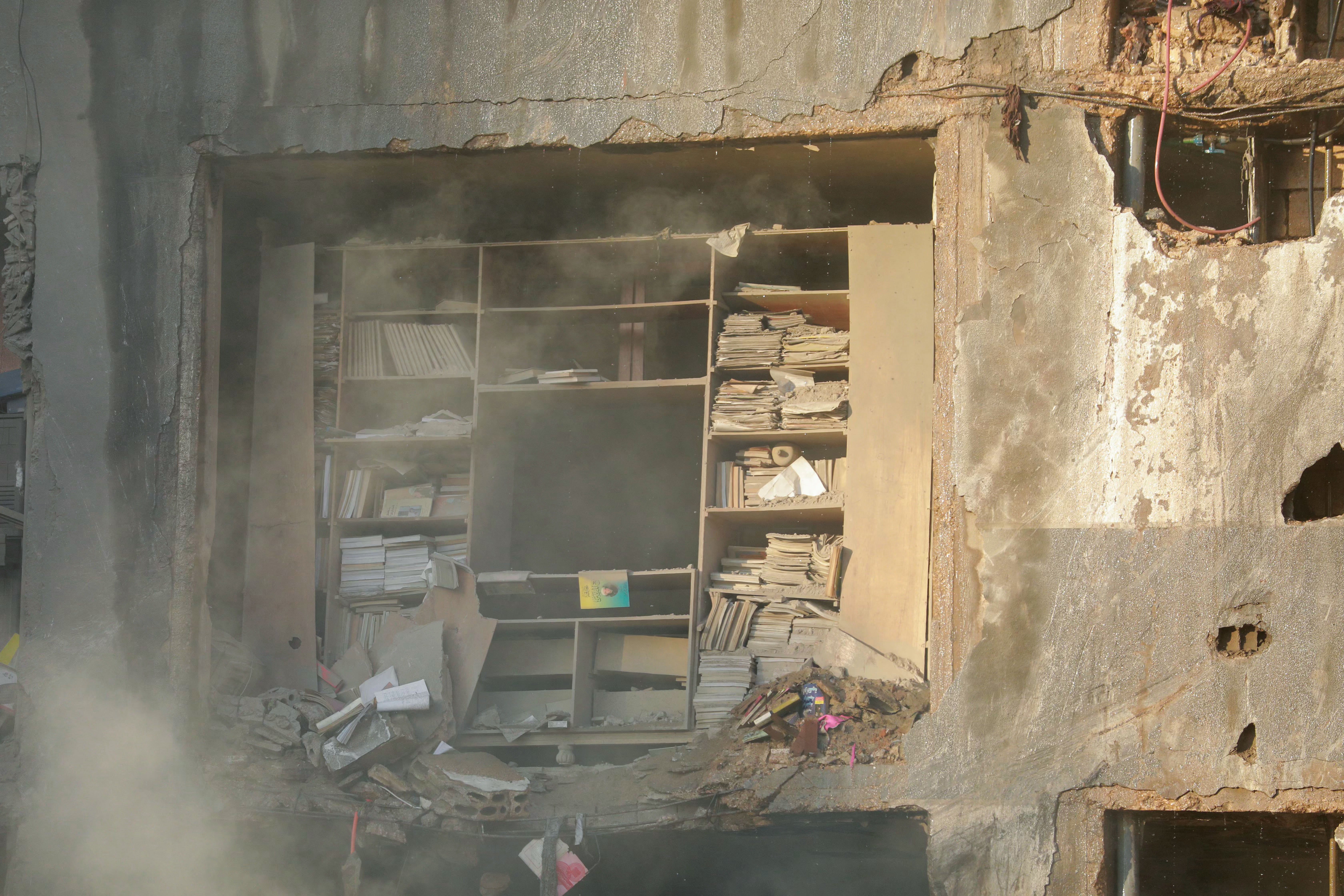Beirut/Jerusalem — The Israeli army on Friday said its forces had hit more than 2,000 sites during its four-day incursion into southern Lebanon targeting alleged Hezbollah positions.
“Over 2,000 military targets have been struck,” including militants, military buildings, weapons, and more, the Israeli military said in a statement.
In another development, Hezbollah said it targeted Israeli troops again in Lebanon, and Israeli army reported that a drone strike launched ‘from the east’ [Iraq] killed two soldiers.
In Beirut, three hospitals in Lebanon including one on the outskirts of Beirut’s southern suburbs announced Friday the suspension of work, amid ongoing Israeli bombardment.
Also Friday, Lebanese Prime Minister Najib Mikati urged the international community to pressure Israel “to allow rescue and relief teams to reach bombed sites and allow them to move” casualties after more than 40 emergency personnel were killed in recent days.
Sainte Therese Hospital on the edge of Beirut’s southern suburbs reported “huge damage” and said “Israeli warplanes’ targeting… the vicinity” of the facility on Thursday “led to the halt of hospital services”, in a statement carried by the official National News Agency (NNA).
South Lebanon’s Mais al-Jabal hospital on the border with Israel announced “the halt to work of all departments”, citing factors including “enemy targeting of the hospital” since last October and problems for supply lines and staff access.
The comment also came in a statement on the NNA.
The director of south Lebanon’s Marjayoun governmental hospital, Mouenes Kalakesh, told AFP that “an Israeli air strike targeted ambulances at the main entrance to the hospital”, killing paramedics who were bringing wounded to the facility.
“We had been providing medical services since the beginning of the war, but staff shortages and today’s bombardment have forced the closure of the hospital,” located less than 10 kilometers (six miles) from the border, he said.
The air strike killed four paramedics from the Hezbollah-affiliated Islamic Health Committee, the NNA said.
Lebanon’s Hezbollah movement and Israel have been exchanging near-daily cross-border fire for almost a year, with the group saying it is acting in support of Palestinian ally Hamas over the Gaza war.
But Israel, saying it is targeting Hezbollah in an effort to make Israel’s northern area safe for the return of displaced people, has intensified its bombardment campaign since September 23.
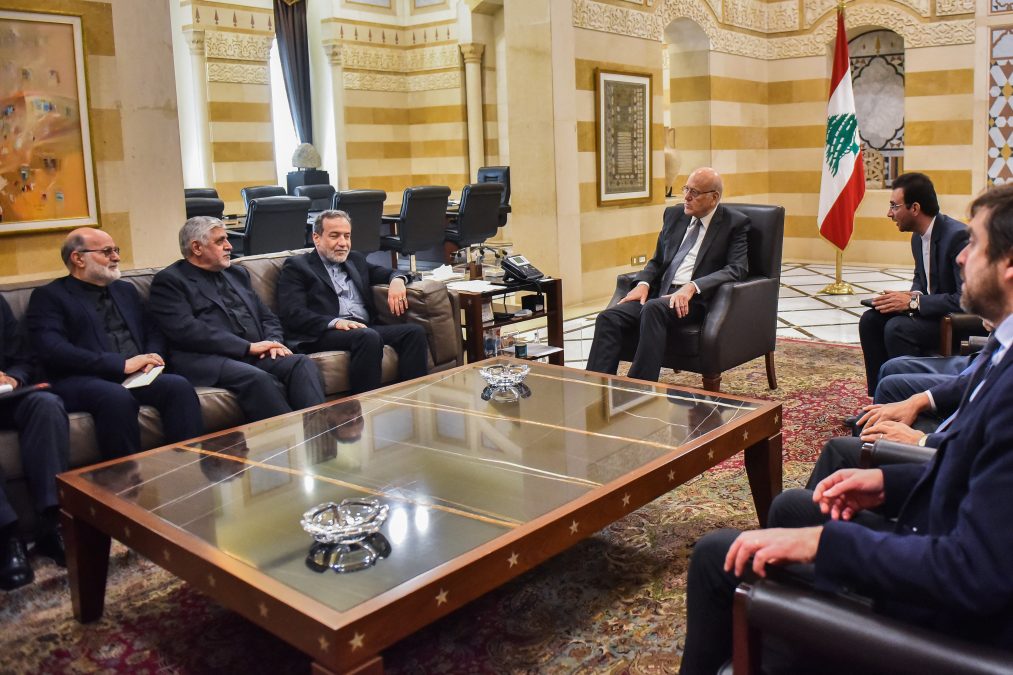
The bombing has killed more than 1,110 people, according to an AFP tally of official figures, and displacing up to one million, according to officials.
Many have fled the Marjayoun area following the recent escalation, with some towns and villages in the area sustaining damage for the first time.
The Marjayoun hospital had been operating “for four days without an anesthesiologist and laboratory specialists, because many people have fled”, Kalakesh said.
Also Friday, Hezbollah said an Israeli strike killed a rescuer at the site of an overnight air raid in south Beirut.
On Thursday, Lebanon’s health minister Firass Abiad said 97 rescuers had been killed since Hezbollah and Israel began fighting last October.
Among that number are more than 40 paramedics and firefighters killed by Israeli fire in just three days, he said.
FRIDAY SERMON OF KHAMENEI
Iran’s supreme leader vowed in a rare address on Friday that his allies around the region would keep fighting Israel, as he defended his country’s missile strike on its arch-foe.
Ayatollah Ali Khamenei’s address in Tehran follows Iran’s second-ever direct attack on Israel and was also the first since exchanges of fire between Tehran-backed Hezbollah fighters and Israeli troops escalated into full-blown war in Lebanon.
Speaking days ahead of the first anniversary of Hamas’s October 7 attack on Israel that triggered the ongoing war in the Gaza Strip and has drawn global condemnation, Khamenei defended the Palestinian group’s “logical and legal” actions and hailed its “fierce defense” against Israeli forces.
Beyond Tehran, crowds of protesters gathered in Jordan and in Bahrain, which both have ties with Israel, after Friday prayers in a show of support for Iran-backed Hamas and Hezbollah.
In Amman, demonstrators carried portraits of militant leaders killed by Israel and posters hailing the October 7 attack as a “sign of pride, glory and dignity”.
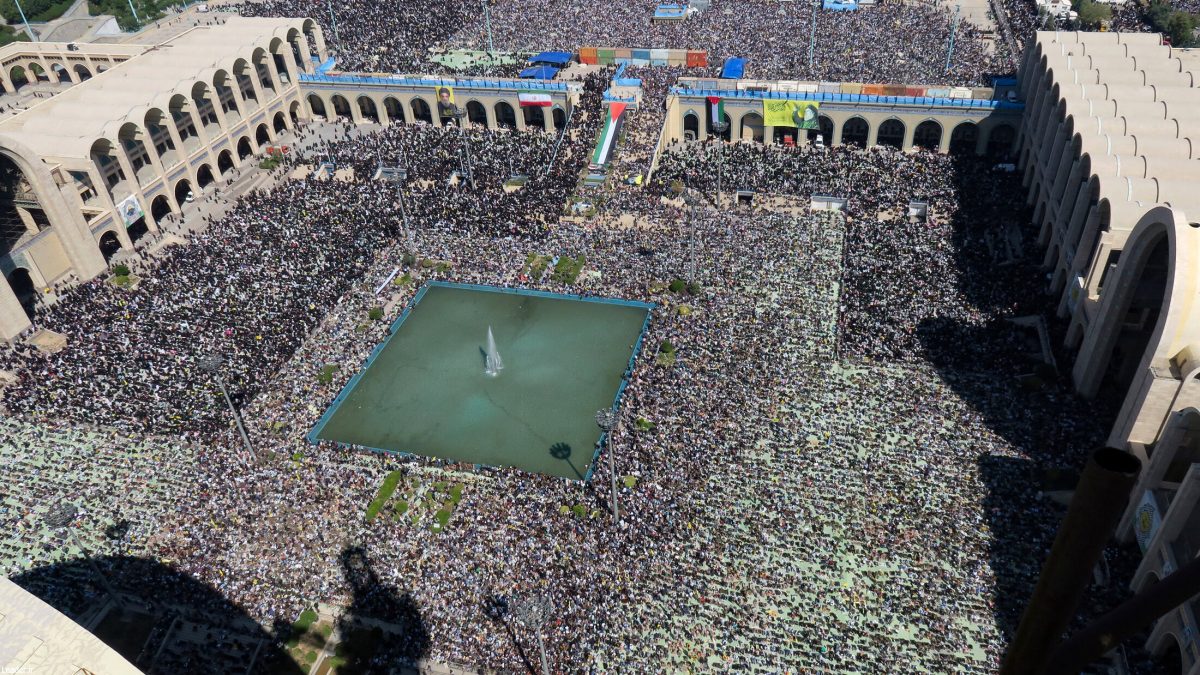
Nearly a year into the Gaza war, Israel has shifted its focus to securing its border with Lebanon, to allow tens of thousands of Israelis displaced by cross-border rocket attacks by Hezbollah to return home.
The attacks have killed an Iranian general, a host of Hezbollah commanders and, in the biggest blow to the group in decades, assassinated its leader, Hassan Nasrallah.
Speaking to a crowd of thousands in Farsi-speaking Iran, Khamenei said in Arabic: “The resistance in the region will not back down with these martyrdoms, and will win.”
The Iranian leader charged that Israel was a “malicious regime” which has “only kept itself standing by the injection of American support”.
It “will not last long”, he said.
Iran’s top diplomat, Abbas Araghchi, visited Beirut and said that his government backs “the efforts for a ceasefire” that would be acceptable to Hezbollah and come “simultaneously with a ceasefire in Gaza”.
FEAR IN LEBANON
The escalation has left people in Lebanon fearful that there will be no swift end to the violence engulfing their country.
In Beirut, 35-year-old displaced nurse Fatima Salah said people were “scared for our children, and this war is going to be long”.
Israel and its ally the United States have vowed respond to the Iranian missile attack, which was largely intercepted but sparked fear in Israel.
Iran said it would step up its response if Israel counterattacked.
Lebanon said an Israeli strike on Friday cut off the main international road to Syria, with Israel claiming that Hezbollah was transporting weapons through the country’s principal land border crossing.
The strike comes after 310,000 people, mostly Syrians, have in recent days fled the war pitting Israel against Hezbollah in Lebanon for relative safety in neighboring Syria.
The Israeli military said its fighter jets struck Hezbollah targets near the border crossing overnight including a tunnel that “enables the transfer and storage of large quantities of weapons”.
On the Israel-Lebanon border, the Israeli military said its forces had killed 250 Hezbollah fighters this week.
And in Hezbollah’s main bastion in Beirut’s southern suburbs, US and Israeli media reports said intense bombardment overnight targeted the militant group’s potential successor, Hashem Safieddine, just a week after Nasrallah’s killing.
The Israeli military has not commented on that strike, which destroyed at least five buildings and left a huge crater in the road, an AFP photographer said.
GROUND RAIDS
Israel announced this week that its troops had started ground raids into parts of southern Lebanon, a stronghold of Hezbollah, after days of heavy aerial bombardment.
Hezbollah said it shelled Israeli troops in a border area of south Lebanon Friday, in the latest such clash on the frontier.
The militant group also said it kept up its rocket fire, with sirens warning of incoming fire blaring in northern Israel Friday.
Lebanon’s health ministry said that 37 people were killed by Israeli strikes over the previous 24 hours.
The Israeli military said nine of its soldiers have been killed in combat in Lebanon.
In the West Bank, which is separated from Gaza by Israeli territory but has endured intense military raids throughout the war, the Palestinian health ministry said an air strike killed 18 people in the Tulkarem refugee camp.
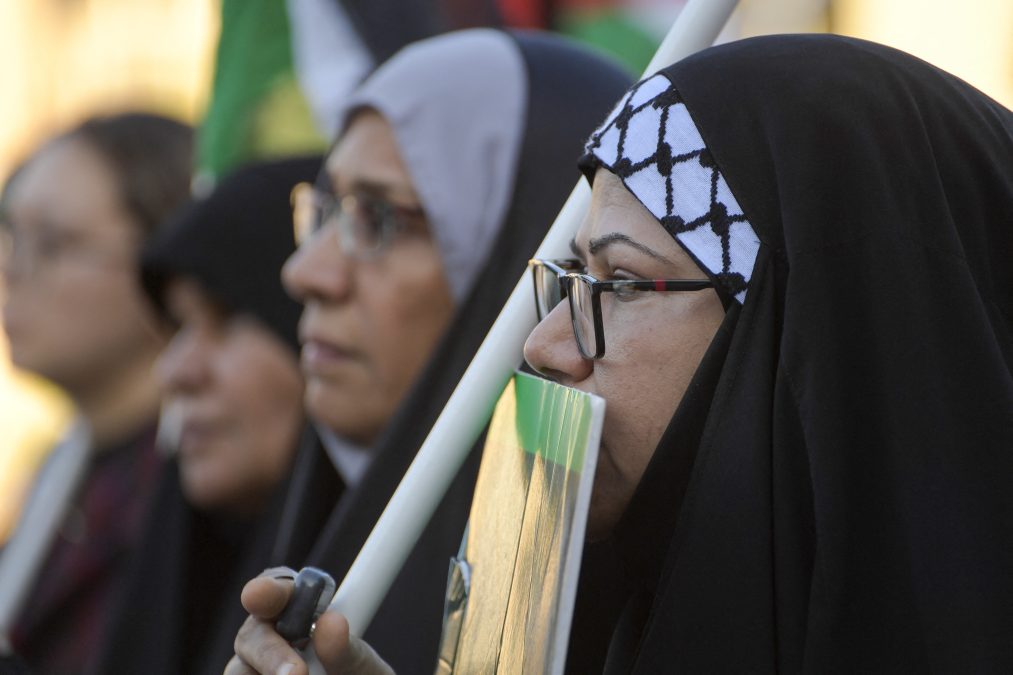
A Palestinian security source told AFP it was the deadliest air raid in the occupied territory since 2000. The Israeli military said the strike targeted a local Hamas leader.
Calls for restraint have multiplied but months of similar calls to halt fighting in Gaza failed to bring a ceasefire.
Israel’s attacks in Gaza have killed at least 41,802 people, the majority of them civilians, according to figures provided by the Hamas-run territory’s health ministry. The United Nations has described the figures as reliable.
The war has left the besieged territory’s 2.4 million facing a dire humanitarian crisis, and in August, the first polio case in 25 years was confirmed.
The World Health Organization said it hopes to give hundreds of thousands of children in Gaza a second dose of polio vaccine from October 14, after a first round last month.
ERDOGAN RAPS ISRAEL OVER UN CHIEF BAN
In Istanbul, Turkish President Recep Tayyip Erdogan on Friday accused Israel of “shamelessly” attacking UN chief Antonio Guterres by declaring him “persona non grata” for not quickly condemning Iran’s ballistic missile barrage.
Israel “is shamelessly challenging UN Secretary-General Guterres,” Erdogan told an audience at a defense technology fair in the southern province of Adana.
He added that “196 countries in the world will stand by the UN secretary-general” against Israel.
Relations between the UN and Israel have been difficult since Hamas’s October 7, 2023 attack on Israel, which sparked the Gaza war.
On Wednesday, Guterres was declared persona non grata by Israeli Foreign Minister Israel Katz, accusing him of failing to specifically condemn Iran’s missile attack on the country this week. Katz called Guterres an “anti-Israel secretary-general who lends support to terrorists, rapists, and murderers.”
“Anyone who cannot unequivocally condemn Iran’s heinous attack on Israel does not deserve to step foot on Israeli soil,” Katz said in a statement.
Guterres pointedly condemned Iran’s attack at a UN Security Council meeting on Wednesday.
On Thursday, the Security Council offered its full support to Guterres.
Without naming Israel, the council’s five permanent members — Britain, China, France, Russia and the United States — and 10 non-permanent members “underscored the need for all member states to have a productive and effective relationship with the secretary-general.”
UN CONDEMNS ISRAEL’S WEST BANK ATTACKS
In Tulkarem, Palestinian Territories, the United Nations on Friday condemned what it called an “unlawful air strike” by Israel on a refugee camp in the occupied West Bank that the Palestinian health ministry said killed 18 people the previous day.
Described as the deadliest air strike in over two decades in the West Bank, the Israeli army said the raid in Tulkarem had succeeded in killing “at least seven terrorists”, including a Hamas leader and an Islamic Jihad member, who were discussing an “imminent terror plan”.
The United Nations Human Rights Office slammed the strike, calling it “unlawful”.
“The strike is part of a highly concerning pattern of unlawful use of force by ISF (Israeli security forces) during military-like operations in the West Bank that have caused widespread harm to Palestinians,” the UN rights office said in a statement.
“The leveling of an entire building filled with people via aerial bombing shows flagrant disregard for Israel’s obligations.”
On Friday, hundreds gathered for a public funeral in Tulkarem, where the bodies of the dead were carried through the streets as people waved flags and fired guns into the air.
Several armed fighters, masked and dressed in black, attended the funeral, an AFP journalist reported.
“We hope that all Palestinian people will join hands, as we have one cause,” Nasser Kharyoush, a father of one of the victims of the raid, told AFP.
Tulkarem was one of the towns and Palestinian refugee camps targeted during a large-scale Israeli military operation in late August against militants based in the West Bank.
Violence in the West Bank has surged alongside the war in Gaza which began after Hamas attacked Israel on October 7.
Since the Hamas attack, Israeli troops or settlers have killed at least 701 Palestinians in the West Bank, according to the Palestinian health ministry.
The United Nations rights office said Thursday’s strike came when there were “no clashes or confrontations” at the site.
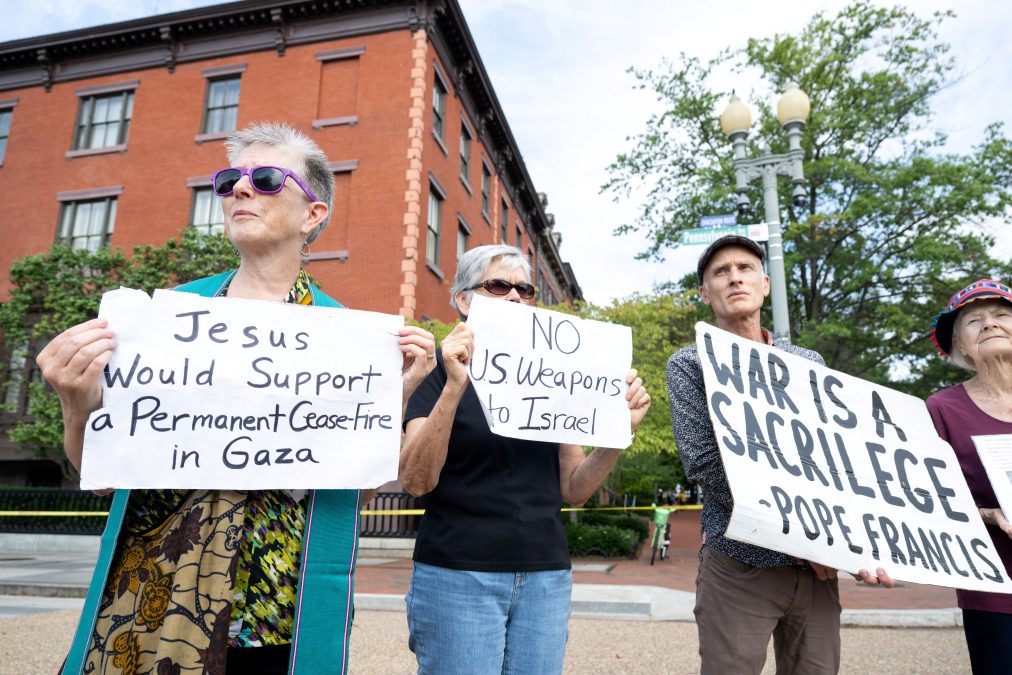
“The air strike completely destroyed the targeted building and also damaged nearby houses,” it said.
“More fatalities may be trapped under the rubble, but recovery and identification are proving difficult in light of the massive impact of the blast.”
Major Israeli operations in the West Bank are sometimes occurring “at a scale not witnessed in the last two decades,” United Nations human rights chief Volker Turk said last month.
Israel has occupied the West Bank since 1967, and its forces regularly make incursions into Palestinian communities. But the current raids as well as comments by Israeli officials mark an escalation.


